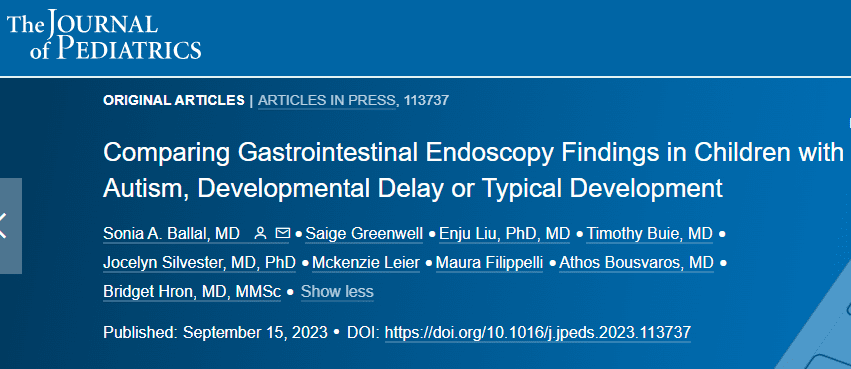Largest Published Endoscopy Study in Patients with Autism
I am so pleased to let everyone know about a recent article in the Journal of Pediatrics featuring the largest published endoscopy study in autism and a comparative review of its findings. Comparing Gastrointestinal Endoscopy Findings in Children with Autism, Developmental Delay or Typical Development is a study performed at Boston Children’s Hospital, which evaluated over 500 children with autism undergoing endoscopy. From the 2,104 patients included in the study, it identified comparison populations of children with other developmental disabilities and typically developing children who were age-matched to assess the endoscopic findings in each group. This is the largest published endoscopy study in autism to date and found that esophagitis was notably more common in the autism population than in comparison groups. There was no higher frequency of GI pathology in the stomach or duodenum in the autism population.
Suspected reflux was the most common reason for endoscopy in each population. One interesting presenting symptom seen more commonly in the autism population was feeding difficulties. There was no higher frequency of Eosinophilic Esophagitis in the autism population. We need to keep in mind that the Boston Children’s Hospital is a large and busy GI practice receiving referrals for work-up. We have a Celiac Center bringing a population of children to endoscopy who have screened positive for Celiac Disease and the largest indicator of duodenal pathology was abnormal Celiac screening. Population studies have shown there is no higher frequency of Celiac disease in autism. The decision to bring a child to endoscopy for investigation is often made after trying to screen for specific conditions as well as treatment trials aimed at comfort management for reflux or other possible conditions. Children with autism frequently have communication impairment and parents and physicians often use their best judgment about abdominal pain. This study did not aim to demonstrate if behaviors like aggression or self-injury were indicators of reflux or esophagitis.
The frequent finding of esophagitis in this population supports the suspicion we have had that there is frequent co-morbidity of GI problems in individuals with autism. We need to consider pain and feeding difficulties in these children and fashion our treatments and care with this new important information. I am grateful Dr. Sonia Ballal took on this challenging study with our co-authors, demonstrating the commitment of Boston Children’s Hospital to the autism community. To view a PDF of the abstract in the Journal of Pediatrics, September 2023, click on this link: https://doi.org/10.1016/j.jpeds.2023.113737

